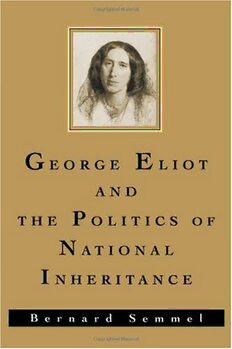
George Eliot and the Politics of National Inheritance PDF
177 Pages·1994·11.706 MB·English
Most books are stored in the elastic cloud where traffic is expensive. For this reason, we have a limit on daily download.
Preview George Eliot and the Politics of National Inheritance
Description:
In this stimulating history of the ideas behind George Eliot's novels, Bernard Semmel explores Eliot's imaginative use of the theme of inheritance, as a metaphor for her political thinking. Through detailed analyses of Eliot's novels and other writings, and a study of the intellectual currents of the time, Semmel demonstrates how and why Eliot's views on inheritance provided central ideas for her fiction. Semmel uncovers Eliot's intent when she wrote of the obligations of inheritance both in the common meaning of the term, as in the transfer of goods and property from parents to children, and in the more metaphoric sense of the inheritance of both the benefits and burdens of the historical past, particularly those of the nation's culture and traditions. He believes Eliot's novels dwelt so insistently on the idea of inheritance in good part because she viewed herself as intellectually "disinherited," writing as she did at a time when much of England was being transformed from a traditional community to an alienating modern society, and when, moreover, she suffered from a painful estrangement from her family. In this thought-provoking study, Semmel dissects the politics of Eliot's novels, including Middlemarch, Daniel Deronda, Romola Felix Holt, and Adam Bede, and convincingly displays the relationship between Eliot's variations on the theme of inheritance and her acceptance of Britain's traditional policies of compromise and reform. All those interested in Victorian literature, history, and political thought will appreciate Semmel's George Eliot and the Politics of National Inheritance.
See more
The list of books you might like
Most books are stored in the elastic cloud where traffic is expensive. For this reason, we have a limit on daily download.
